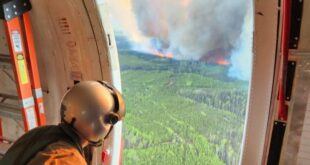Data gathered using non-invasive technique could expedite future conservation efforts, say researchers

It was just after 8 a.m. when Gary Sutton and his crew spotted the signature black dorsal fins cutting through the cool waters of the Salish Sea, off the coast of Vancouver Island.
More than a dozen Bigg's killer whales, also known as transient killer whales, swimming north in search of food. They surfaced every few minutes, the spray of their respiration punctuating the otherwise quiet winter morning.
While few things command presence of mind quite like the sudden appearance of a pod of whales, Sutton, a research technician with the non-profit conservation group Ocean Wise, and his fellow researchers have spent more than a week on the water regularly observing the whales and combing for data that might assist the animals in the not-so-distant future.
They have been collecting water samples to study the environmental DNA (eDNA) of Bigg's killer whales, North Pacific humpbacks and B.C.'s endangered southern resident killer whales.
An emerging approach to studying marine life, the researchers believe eDNA could assist whale recovery, by providing better data around the mammals' prey and ecosystems — information that could produce better strategies for conservation.
"It's like CSI in the ocean," he said.
Less invasive approach
A comparatively new field of research, eDNA offers scientists a non-invasive way to study marine life by analyzing mucus, feces, and other tissue particles shed by animals into the water, in order to determine what Sutton calls their "genetic footprint," including the sex and even the paternity of individual whales, which often remains a mystery.
The approach is considered less invasive than the traditional method, which centres on tracking animals and then gathering a biopsy for analysis.
"I can count probably on one hand the number of papers that have been published focusing on eDNA for whales in particular," said Chloe Robinson, Ocean Wise's director of whales. "We're doing a lot of the work to standardize the methods."
Robinson says B.C.'s southern resident killer whales are a "fantastic population to trial these noninvasive eDNA methods" because their small size has allowed them to be thoroughly studied, offering researchers troves of "hard data" to compare with the new eDNA gathered.
She adds that eDNA is also useful in monitoring the prey whales are eating, and the broader genetic makeup of various species.
Symbol of B.C.'s south coast
A symbol of the province's south coast, inspiring everything from sightseeing tours to souvenirs and B.C. Ferries signage, B.C.'s southern resident killer whale population has spent several decades in decline.
"A lot of the obstacles they face are because of us," said Sutton, pointing to the rampant capturing of killer whales along the coast between B.C. and Washington state in the 1960s and '70s, which saw many animals caught and sold to aquariums around the world.
.png?crop=1.777xh:h;*,*&downsize=510px:*510w)
UBC researchers investigate new population of killer whales
14 days ago
A group of 49 orcas has been observed hunting sperm whales in the open ocean off the coast of California and Oregon. Researchers from the University of B.C. say this population is new to them and could belong to a subpopulation of transient killer whales or could be a unique population.
The U.S. Environmental Protection Agency estimates, between 1967 and 1971, the killer whale population declined by 30 per cent.
In 1975, Canada banned the capture of killer whales. However the population has struggled to recover in subsequent decades amid myriad issues, including a lack of prey, pollution, ship strikes and noise.
At time of publication, B.C.'s southern resident killer whale population is 75.
'Immediate effective action'
Few people will ever see a killer whale pod up close. Sutton, however, knows the group well enough that he can identify certain whales using subtle markers including the size of their dorsal fins, eye patchs and saddle patch shape.
From the top deck of the group's eight-metre long boat, he saw that the pod, which he said includes at least three different family groups, had grown ever so slightly.
"One of the older females, T124A1, has a calf," he said. "It's her first calf, which is really exciting."
After a whale breaches, researchers move swiftly — sometimes as quick as 90 seconds, according to Sutton — to scoop up the water it was swimming in, before filtering it on the boat.
The sample is later analyzed for select "primers" — target sequences of genetic material.
The Department of Fisheries and Oceans says is exploring the use of eDNA tools. "Through the study of genetic material shed by organisms in their environment, eDNA can help us detect which species, native or not, are in our waters," the department wrote in an email to CBC.
"For instance, through early detection of aquatic invasive species, we can take preventative actions sooner," they said.
While not focused specifically on recovery, the Ocean Wise researchers hope the current study could inform strategies moving forward.
"[These techniques] mean more targeted conservation efforts so you can have the best bang for your buck, and immediate effective action," said Sutton. "That's what these animals are in dire need of."
ABOUT THE AUTHOR
Network Field Producer
Ethan Sawyer is a Network Field Producer for CBC News. You can contact him at ethan.sawyer@cbc.ca, or by phone at (604) 662-6784.
With files from Georgie Smyth and Andrew Lee
*****
Credit belongs to : www.cbc.ca
 MaharlikaNews | Canada Leading Online Filipino Newspaper Portal The No. 1 most engaged information website for Filipino – Canadian in Canada. MaharlikaNews.com received almost a quarter a million visitors in 2020.
MaharlikaNews | Canada Leading Online Filipino Newspaper Portal The No. 1 most engaged information website for Filipino – Canadian in Canada. MaharlikaNews.com received almost a quarter a million visitors in 2020.






